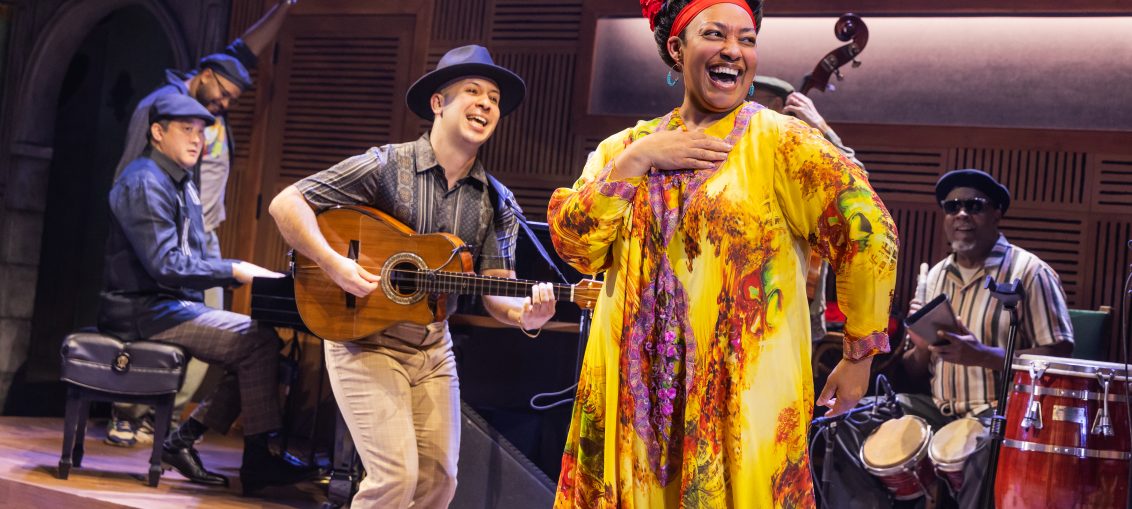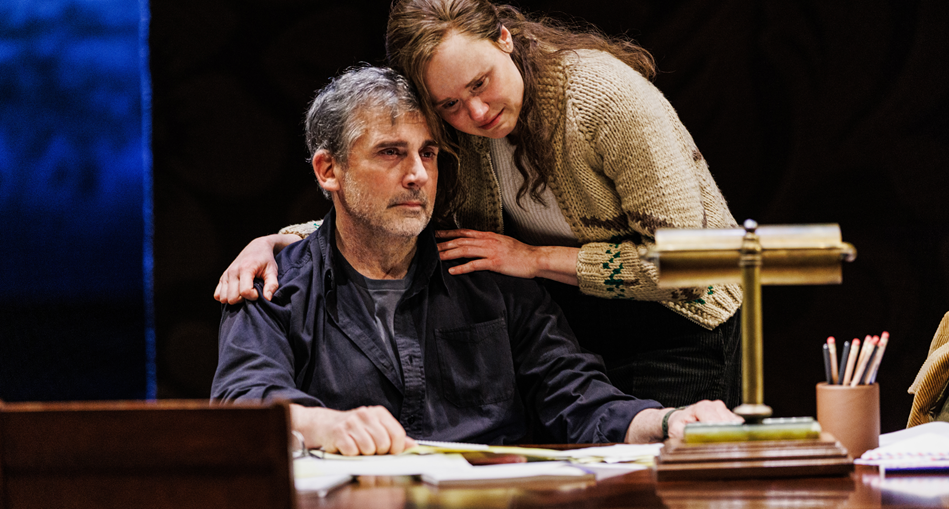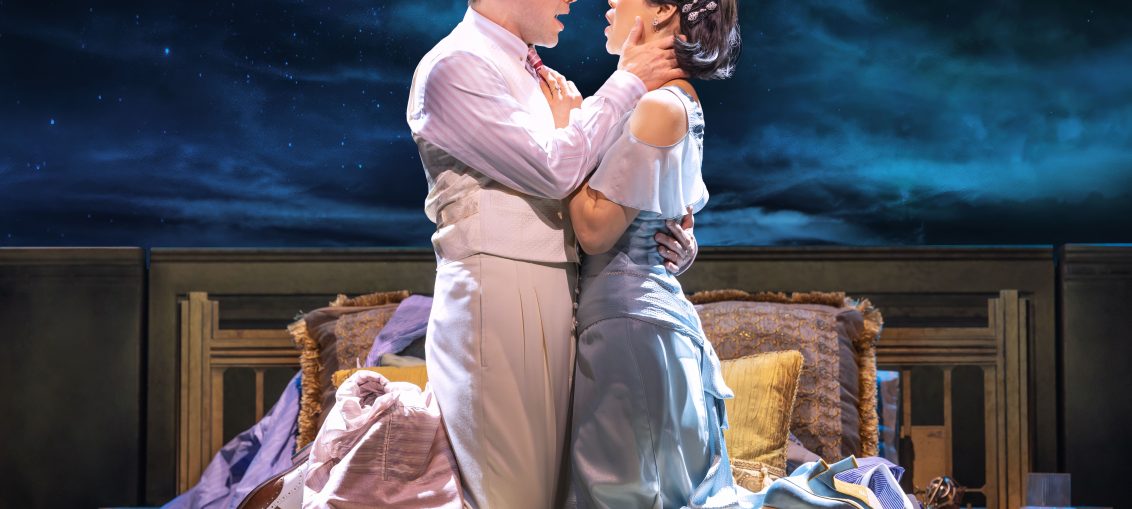Grief certainly makes for good drama: Unpredictable, unreliable and messy, it can be a great basis for an emotionally intense play. Unfortunately, in Grief Camp, the new play written by Eliya Smith in her off-Broadway debut running through May 11 at the Atlantic Theater Company, grief is less dramatic than it is befuddling. The play appears to follow a group of kids and young adults who have gathered at a camp in aptly named Hurt, Virginia, to attend the titular camp and mourn their losses together. The kids grieve in different ways: One is writing a solo play that becomes increasingly
Author: Jena Tesse Fox
Floyd Collins: Finding Fortune & Glory
The cavernous Vivian Beaumont theater at Lincoln Center is a surprisingly brilliant choice for staging the Broadway premiere of Floyd Collins, Tina Landau and Adam Guettel’s 1994 musical about a man trapped in a tunnel dozens of feet underground. While the stage itself is massive, Landau’s intelligent staging, dots’ effective sets and Scott Zielinski’s haunting lighting create a sense of claustrophobia that only grows as the show goes on. Based on the true story of one of America’s first media circuses, the musical follows the titular Floyd, a working-class man who, in 1925, set out to find a subterranean cave that
Churchill One Acts: Glass. Kill. What If If Only. Imp
Caryl Churchill is famous—or perhaps infamous—for taking bold leaps in her plays and circumventing both theatrical conventions and audience expectations, leveraging both fantasy and surrealism to comment on the world as it is and as it could be. A series of her one-act-plays, now running at the Public Theater through May 11, is an excellent sampler of her unique style—but unfortunately, Glass. Kill. What If If Only. Imp is uneven in balancing that style with substance. The first act is the first three plays, with the much longer one, Imp, making up act two of the evening. Glass follows several inanimate
Ghosts: Ibsen for a New Generation
After a season of “reimaginings” of classic works that completely overhaul original concepts, it is somewhat refreshing to have a more traditional revival of Ghosts, Henrik Ibsen’s classic that is ending its run next weekend at Lincoln Center’s Mitzi Newhouse Theater. The 1882 play tackles infidelity, sexually transmitted diseases, incest and euthanasia across different levels of Norwegian society, following a mother, her son and other people in their orbit as devastating family secrets come to light. The salacious subject matter was shocking for its time, and sparked a vitriolic pushback from the public — including royalty — before it was eventually
Old Friends: Celebrating a Master’s Art
One of Stephen Sondheim’s most famous maxims was that a musical’s content should dictate each song’s form—in other words, the framework of the musical itself will determine what the songs should sound like. This can make taking the songs out of the full musical work challenging, since they are so intricately entwined into the musicals they come from. In creating Old Friends, a Sondheim revue running through June 15 at Manhattan Theatre Club, creator Cameron Mackintosh and director Matthew Bourne try to have it both ways. Some songs are performed as in a concert, with performers in formal dress singing directly
Buena Vista Social Club: Celebrating Cuban Music and Culture
While any number of musicals are based on popular movies, precious few are based on documentaries. Fortunately, Saheem Ali had the wonderful idea to bring Wim Wender’s 1999 documentary Buena Vista Social Club to the stage. After a run at Atlantic Theater Company in late 2023, the celebration of Cuban music and history has come to Broadway. The musical’s (rather thin) story evokes the melodrama of classic telenovelas, with a romance that is star-crossed by class divisions and a passionate artist who must choose between creating music for the world or for her own community. In 1959, as revolution sweeps across
What Future Revivals Can Learn from Cats
The latest revival of Andrew Lloyd Webber’s Cats, which closed this weekend at the Perelman Performing Arts Center in New York City’s financial district after multiple extensions, may well be one of the most significant and influential theater revivals in recent memory. Not only was the production genuinely enjoyable and moving, it is a perfect demonstration of how ingenuity and creativity can completely reimagine a classic piece of art for a new audience and a new generation. Not About Cats According to legend, when Webber approached director Harold Prince in the early 1980s to gauge his interest in directing the musical, Prince
Uncle Vanya: Tragically Funny
If Lincoln Center's revival of Anton Chekhov's Uncle Vanya feels both timely and timeless, we can thank playwright and actress Heidi Schreck for her smart adaptation of the 1898 classic. With no references to anything that would place the story in a particular time or place (money is referred to as dollars, people reference “calling” each other rather than “calling on” someone), the play becomes universal—and all the more poignant. In Schreck’s hands, the lengthy Russian names become Anglicized and more approachable for American audiences—Aleksandr is now Alexander and Yelena is Elena, for example. But Ivan is still affectionately called Vanya
Patriots: Absolute Power
Peter Morgan has written any number of excellent plays, movies and TV series about world leaders, from Richard Nixon to Idi Amin to Queen Elizabeth II. But Patriots, his latest piece directed by Rupert Goold and running through June 23 the Ethel Barrymore Theatre, does not carry the same weight as Frost/Nixon, The Last King of Scotland or The Audience (or The Queen, or The Crown for that matter). It’s not that the story doesn’t have grand ambitions, but Patriots does not quite reach its goals. The play follows Boris Berezovsky, a former mathematician whose love of numbers makes him a
The Great Gatsby: Not So Great
We all knew the musical adaptations of The Great Gatsby would be coming as soon as F. Scott Fitzgerald’s 1925 book entered the public domain, and the first of what will inevitably be many such productions is finally open at the Broadway Theater. And much like Jay Gatsby’s signature parties, the new musical is very flashy and bright and loud but there’s not an awful lot underneath. Jason Howland and Nathan Tysen’s score is full of bright pop songs that don’t really evoke the 1920s or the wild hedonism of pre-Depression New York. The songs are fine but not terribly memorable,
 Friday, January 2, 2026
Friday, January 2, 2026



